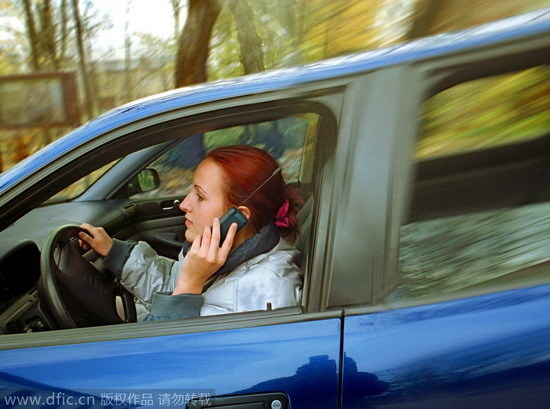 |
|
A young woman makes a phone call with her mobile phone while driving her car on the 5th of November in 1999. [Photo/IC] |
Late last month Leqing court in Zhejiang province sentenced a 22-year-old man to one year in prison with an 18-month reprieve and and ordered him to pay 200,000 yuan civil compensation for accidentally hitting a pedestrian while driving and trying to delete a game app on his cellphone.
According to official statistics, the use of cellphones while driving is the top reason for traffic accidents leading to death in Zhengzhou, Henan province-more than those caused by speeding, overtaking from the wrong side and drunk driving.
Studies show that staring at a cellphone for 3 seconds while driving at a speed of 60 kilometers an hour is as dangerous as "blind driving" for 50 meters. In fact, the United States National Safety Council said in 2014 that mobile devices were involved in 26 percent of all vehicle crashes.
The call to make the use of cellphones while driving a crime is growing. Many netizens even say the use of cellphones while driving should be treated on par with driving under the influence. But before jumping to conclusions, we should analyze whether the proposed punitive measures are appropriate for the action.
First, the degree of danger posed by the use of cellphones while driving varies. For example, sending text messages, playing games or watching videos are considered very dangerous activities, while making phone calls with Bluetooth or using a cellphone as GPS is less dangerous. So they do not deserve equal penalty.
And second, while amending a law, it is advisable to be cautious and conservative. In China, if a person is incriminated or sentenced by a court-no matter whether he/she is imprisoned or fined-h(huán)is/her reputation is greatly damaged. Many people find it difficult to get re-employed after serving a sentence; they are even discriminated against. Therefore, the law should be applied with utmost discretion.
According to the existing national traffic code, it is illegal to use hand-held phones while driving, and an offender could have 2 scores stuck off his/her license and have to pay a fine up to 200 yuan ($30.1).
But the rule has not been strictly enforced, because many such violations have gone unpunished. Perhaps not having a specific enforcement standard has something to do with it. For instance, a person is guilty of driving under the influence if the alcohol level in his blood is 20mg/100ml or above, for which he/she should be punished according to administrative rules-and if the alcohol level is 80mg/100ml or above, it would constitute a crime.
Compared with this rule, the use of cellphones while driving is more complex offense. Moreover, it is difficult to pinpoint the gravity of the offense and preserve evidence.
But that does not mean nothing can be done to stop people from using cellphones while driving. To begin with, the traffic code should be modified to differentiate the nature of the offense and impose punishments accordingly. Public transport and goods vehicle drivers should be totally banned from using cellphones while driving, because one mistake from them can cause very serious damage, with drivers in general being prohibited from sending text messages, playing games, watching videos, or reading news or messages on their cellphones while driving. Talking on the phone with Bluetooth, however, could be acceptable.
Besides, heavier fines should be imposed on offenders and more points should be deducted from their licenses to deter people from using cellphones while driving. And probationary drivers who violate rules should be barred from getting a permanent driving license to help novice drivers learn good driving habits.
Moreover, technology innovation can always play a part. For example, auto companies should be urged to design and install more updated and affordable driving assistance tools, even though some companies have developed voice tools to help phone calls made by drivers relatively safe. Also, better technology can help capture violations and record evidence more efficiently.
Finally, people, drivers in particular, should improve their safety awareness and realize that life is much more important than cellphones.
The author is a fellow at the research office of Shunyi Court in Beijing.

I’ve lived in China for quite a considerable time including my graduate school years, travelled and worked in a few cities and still choose my destination taking into consideration the density of smog or PM2.5 particulate matter in the region.